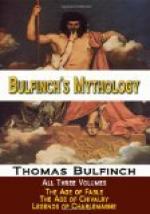In search of such an infant, Vortigern sent his messengers all over the kingdom, and they by accident discovered Merlin, whose lineage seemed to point him out as the individual wanted. They took him to the king; but Merlin, young as he was, explained to the king the absurdity of attempting to rescue the fabric by such means, for he told him the true cause of the instability of the tower was its being placed over the den of two immense dragons, whose combats shook the earth above them. The king ordered his workmen to dig beneath the tower, and when they had done so they discovered two enormous serpents, the one white as milk the other red as fire. The multitude looked on with amazement, till the serpents, slowly rising from their den, and expanding their enormous folds, began the combat, when every one fled in terror, except Merlin, who stood by clapping his hands and cheering on the conflict. The red dragon was slain, and the white one, gliding through a cleft in the rock, disappeared.
These animals typified, as Merlin afterwards explained, the invasion of Uther and Pendragon, the rightful princes, who soon after landed with a great army. Vortigern was defeated, and afterwards burned alive in the castle he had taken such pains to construct. On the death of Vortigern, Pendragon ascended the throne. Merlin became his chief adviser, and often assisted the king by his magical arts.
“Merlin, who knew the range
of all their arts,
Had built the King his havens,
ships and halls.”
—Vivian.
Among other endowments, he had the power of transforming himself into any shape he pleased. At one time he appeared as a dwarf, at others as a damsel, a page, or even a greyhound or a stag. This faculty he often employed for the service of the king, and sometimes also for the diversion of the court and the sovereign.
Merlin continued to be a favorite counsellor through the reigns of Pendragon, Uther, and Arthur, and at last disappeared from view, and was no more found among men, through the treachery of his mistress, Viviane, the Fairy, which happened in this wise.
Merlin, having become enamoured of the fair Viviane, the Lady of the Lake, was weak enough to impart to her various important secrets of his art, being impelled by fatal destiny, of which he was at the same time fully aware. The lady, however, was not content with his devotion, unbounded as it seems to have been, but “cast about,” the Romance tells us, how she might “detain him for evermore,” and one day addressed him in these terms: “Sir, I would that we should make a fair place and a suitable, so contrived by art and by cunning that it might never be undone, and that you and I should be there in joy and solace.” “My lady,” said Merlin, “I will do all this.” “Sir,” said she, “I would not have you do it, but you shall teach me, and I will do it, and then it will be more to my mind.” “I grant you this,” said Merlin. Then he began to devise,




